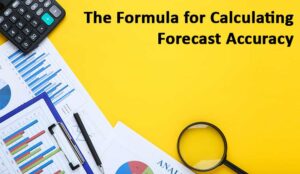By regularly calculating and analysing forecast variance, contact centres can enhance their operational efficiency and better meet customer demand.
But when standardising forecast variance reporting across multiple business units, the challenge often arises from differing methodologies and interpretations.
So is there a standard calculation for this?
When Rod asked our Community of industry professionals this question, it seemed like the perfect opportunity to look into this:
Is there a standard calculation to measure the variance of the forecasted calls against actual calls?
The calculation I currently use is:
((Forecasted Calls-Actual Calls) / Actual Calls)
which gives the forecasted call variance as a percentage of the actual. This ensures the forecasts are measured against the actual and it is this difference that is reported.
However, we are trying to standardise how forecast variance is reported across all our business units to ensure consistency and it has turned out to be a much bigger issue than expected as there have been a number of calculations put forward.
Any advice on a final calculation will be much appreciated.
Forecast Variance Calculation
Calculating forecast variance in a contact centre involves comparing the forecasted volume of calls (or interactions) against the actual volume received over a specific period.
Here’s a step-by-step guide on how to do this:
1. Choose Your Calculation Method & Calculate Variance
You can use different formulas to calculate the forecast variance. Here are the most common methods:
Percentage Variance
This method shows how much the forecast deviated from the actual results as a percentage of the actual calls.
The formula used to calculate Percentage Variance is:
Percentage Variance = ((Forecasted Calls – Actual Calls) ÷ Actual Calls) × 100
What this shows:
- A positive value indicates over-forecasting (more forecasted calls than actual).
- A negative value indicates under-forecasting (fewer forecasted calls than actual).
Example of Percentage Variance
An simple example of the Percentage Variance calculation, using a forecast of 100 calls for a specific day, but the actual number of calls was 80.
Percentage Variance = ((100 – 80) ÷ 80) × 100 = (20 ÷ 80) × 100 = 25%
This indicates a 25% over-forecast.
Absolute Variance
This method simply shows the difference in numbers, which can be useful for understanding the actual volume difference.
The formula used to calculate Absolute Variance is:
Absolute Variance = Forecasted Calls – Actual Calls
What this shows:
- A positive value means you overestimated.
- A negative value means you underestimated.
Example of Absolute Variance
An simple example of the Absolute Variance calculation, using a forecast of 100 calls for a specific day, but the actual number of calls was 80.
Absolute Variance = 100 – 80= 20
This indicates you overestimated by 20 calls.
Mean Absolute Percentage Error (MAPE)
This method measures the accuracy of forecasts across multiple periods by calculating the average percentage error between forecasted and actual values, allowing organisations to gauge how closely their predictions align with real outcomes.
This is done by following these three steps:
- Calculate the absolute percentage error for each observation.
- Sum all the absolute percentage errors.
- Divide by the number of observations to find the MAPE.
Example of MAPE
Let’s say you have the following forecasted and actual calls over 4 weeks:
| Week | Forecasted Calls | Actual Calls |
|---|---|---|
| 1 | 100 | 90 |
| 2 | 150 | 130 |
| 3 | 200 | 220 |
| 4 | 250 | 240 |
For each week, calculate the absolute percentage error using the formula:
Absolute Percentage Error = ((Actual – Forecasted) ÷ Actual) × 100 =
Using this formula you would calculate the absolute percentage errors for each week like this:
| Week | Forecasted Calls | Actual Calls | Formula | Absolute Percentage Error |
|---|---|---|---|---|
| 1 | 100 | 90 | ((90 – 100) ÷ 90) × 100 = (-10 ÷ 90) × 100 = 11.11% | 11.11% |
| 2 | 150 | 130 | ((130 – 150) ÷ 130) × 100 = (-20 ÷ 130) × 100 = 15.38% | 15.38% |
| 3 | 200 | 220 | ((220 – 200) ÷ 220) × 100 = (20 ÷ 220) × 100 = 9.09% | 9.09% |
| 4 | 250 | 240 | ((240 – 250) ÷ 240) × 100 = (-10 ÷ 240) × 100 = 4.17% | 4.17% |
Then you would add the absolute percentage errors together:
Total Absolute Percentage Error = 11.11 + 15.38 + 9.09 + 4.17 = 39.75%
Finally, divide the total by the number of observations (in this case, 4 weeks) to find the MAPE.
MAPE = Total Absolute Percentage Error ÷ Number of Observations
In this context, “observations” refers to the individual data points or time periods for which you’re comparing forecasted and actual values. Each observation is one instance where a forecasted value is matched with the corresponding actual value.
So with our example this would be:
MAPE = 39.75% ÷ 4 = 9.94%
This means, on average, the forecasts were off by approximately 9.94% from the actual calls.
What this shows:
- A lower MAPE indicates better forecasting accuracy.
2. Analyse Results
Look for trends or patterns in the variances over time. For example, consistent under-forecasting during peak hours might indicate a need for a more aggressive forecasting model.
Then based on the variance analysis, refine your forecasting models to improve accuracy for future periods.
3. Report Findings
Use charts or graphs to present the variances clearly to stakeholders., to help in making data-driven decisions. You should also share insights with the team to inform staffing and operational decisions, ensuring the contact centre is prepared for anticipated call volumes.
For more advice you could also watch this video where Chris Dealy, WFM Evangelist at injixo, outlines the methods that contact centres can use to calculate forecast accuracy
You can also read the full transcript.
Lets also take a look at what other advice the industry professionals put together to help answer the question:
You Need to Set Your Own Company Standard for Variance
I don’t think you need to have a definitive industry standard, but you need to set your own company standard.
Many parts of an organisation all reporting the same factor but with different calculations. The best resolution ( if you can manage this) is to pick one suitable method and ensure everyone uses the same calculation.
It doesn’t then matter too much if it is an “industry” accepted method because you can make direct comparisons within your business.
Contributed by: David
Don’t Always Believe What People Say
Of course everyone will say the method that portrays them in the best light will be the correct one.
For what it’s worth I use 1 – (Actual / Forecast) as a percentage.
Contributed by: Dave
This article was made possible due to the great community of experts we have at Call Centre Helper, to get involved just join our LinkedIn Community and and if you aren’t already make sure you are following us on LinkedIn to see our latest content.
If you are looking for answers to more common call and contact centre questions, read these articles next:
- How to Calculate FTE Requirements Based on Volume
- How to Calculate Required FTE for Inbound Call Volumes
Author: Jonty Pearce
Reviewed by: Robyn Coppell
Published On: 12th Apr 2022 - Last modified: 3rd Oct 2025
Read more about - Call Centre Questions, Call Centre Answers, Chris Dealy, Forecasting, How to Calculate




































